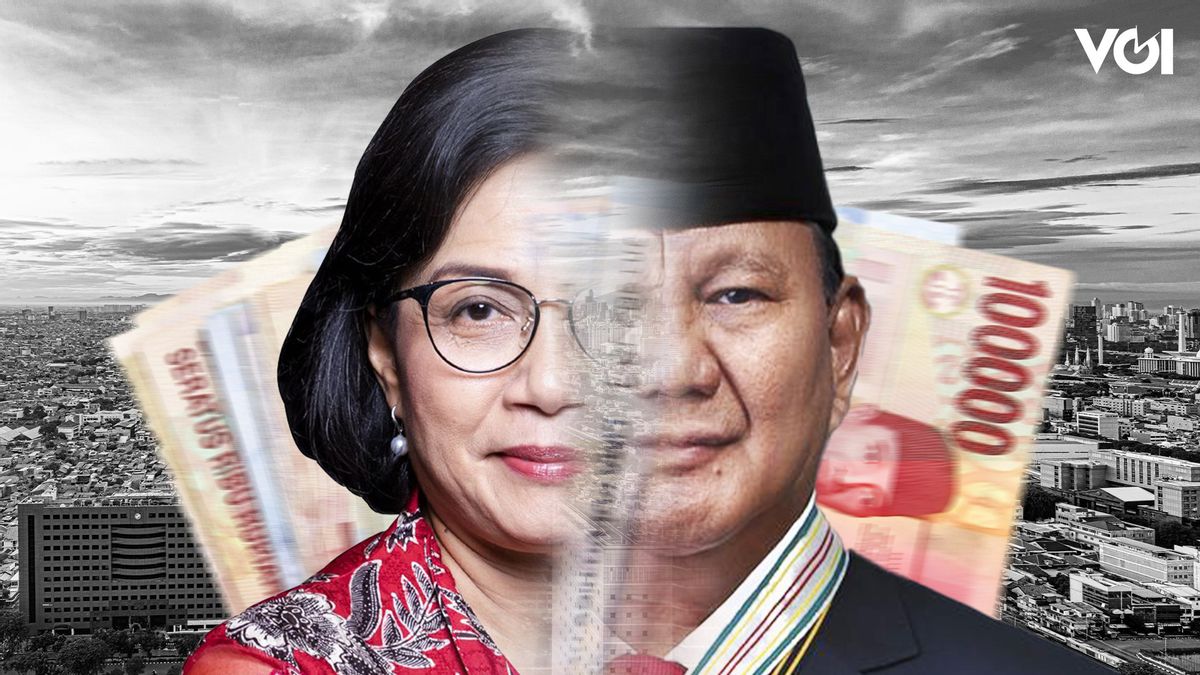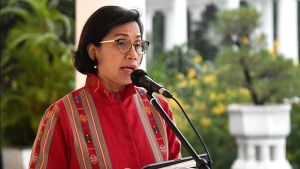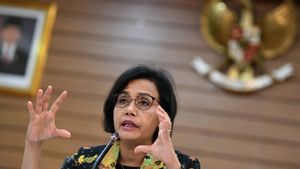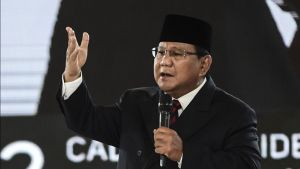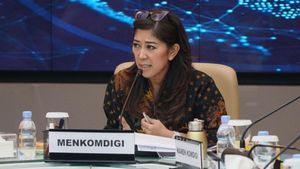JAKARTA - The re-imposition of Sri Mulyani Indrawati as Minister of Finance in the Red and White Cabinet is not without reason. Prabowo felt the need to re-elect Sri Mulyani as Minister of Finance. Although previously Prabowo had prepared his nephew, Thomas Djiwandono at the ministry of finance. The basis for the appointment was due to various considerations related to his competence, Sri was proven to be reliable in managing the country's economy and finances.
The appointment of Sri Mulyani Indrawati (SMI) as Minister of Finance is actually not compatible with President Prabowo's vision. Prabowo promised partiality to the people with various populist programs. Meanwhile, SMI has been known to be too pro-market.
However, the former Executive Director of the International Monetary Fund (IMF) of Southeast Asia is expected to continue to bring stability and sustainability to fiscal policy, especially in the midst of Indonesia's efforts to overcome global economic challenges, as well as strengthen post-pandemic economic recovery.
"The figure of SMI is a figure with good integrity and credibility so that it gains the confidence of market participants," said economist and Director of IDEAS (Institute for Democracy and Credit Studies), Yusuf Wibisono, contacted by VOi, November 10.
VOIR éGALEMENT:
Yusuf added that the reason for choosing a Master graduate from the University of Illinois at Urbana Champaign, United States is because SMI also has a close relationship with multilateral financial institutions and is easily accepted by the international financial community because it has served as Director of Operations of the World Bank. Non-partisanism and more guided by professional considerations and rational arguments in policymaking, is the key to the trust of many parties in this Minister of Finance. "The closeness of access to global financing sources and the world financial community is the main reason for re-electing SMI as Minister of Finance," he said.
In addition, his leadership experience during his tenure as Minister of Finance since December 5, 2005 since President Susilo Bambang Yudhoyono, made him have credibility and trust, both at home and abroad. This decision is in line with Prabowo's need to ensure that his new government has a team that is able to maintain economic growth while attracting foreign investment effectively.
However, despite this reason, President Prabowo must prepare for the risk of appointing SMI to become Minister of Finance again. According to Yusuf, SMI has two minus notes as Menkui. First, failing to increase tax revenue, in two tax amnesty programs. Second, failing to withstand the burden on government debt. Debt has significantly burdened the state budget significantly in the last 10 years. The debt interest expense has continued to increase in the last 1 decade, especially after the pandemic. In 2015 the interest expense of new' debt was in the range of IDR 150 trillion, now to IDR 500 trillion in the 2024 State Budget. Moving from 17.9% to 24.4%.
So, choosing SMI certainly has a risk for President Prabowo. President Prabowo's populist programs such as Free Nutrition Food (MBG), require massive budget support. Therefore, an absolute tax ratio increase is needed. But in the last 10 years, our tax ratio is stagnant. Without an increase in tax ratio, the state budget will certainly be further immersed in debt piles. "We certainly should be worried if SMI's re-pointment is motivated by motivation to make debt a mainstay of financing the elected president's populist programs," explained the UI economist.
We hope that President Prabowo has a clear vision and direction for the Minister of Finance to seriously increase the performance of tax revenues, as well as reduce the burden on government debt. The Minister of Finance must no longer violate macroeconomic discipline in any name. During the pandemic, for the first time after the 1997 crisis, the government violated 2 most important macroeconomic disciplines, namely violating fiscal discipline in the form of a maximum budget deficit of 3% of GDP and the central bank monetizing government debt where BI bought SBN in the primary market.
The Minister of Finance must also be able to increase tax revenue. With only a higher tax ratio, we are able to reduce the ratio of government debt by the end of 2023 which reached 38.59% with an absolute value of government debt exceeding Rp. 8,145 trillion.
In the era of President Prabowo, the challenge for the Minister of Finance was not only to finance President Prabowo's populist programs. But also the payment of a very burdensome debt burden. In the era of President Prabowo, this debt burden problem will be increasingly serious. Until we still need to establish good relations with institutions such as the IMF (International Monetary Fund) and other countries that can provide loans.
The relationship between Indonesia and the IMF is indeed ups and downs, the IMF, which had given a loan during the crisis that hit Indonesia. The experience with the IMF was considered to have intervened a lot in regulating sovereign governance, due to several pressures experienced by the government at that time. Among other things, the push to close a number of national banks, citing restructuring, and other interventions, several bills allegedly containing certain contents, on the grounds that restructuring further opened access to privatization of business entities.
However, Prabowo as President of Indonesia wants to maintain Indonesia's membership in the IMF, this decision brings benefits as well as challenges. The IMF as an international financial organization has a role in providing assistance, policies, and global economic analysis. However, IMF membership is also often debated regarding the impacts and requirements it imposes.
Indonesia's advantages and disadvantages if it persists in the IMF include access to Aid Funds in the Economic Crisis. In emergency conditions, such as financial crises or natural disasters. The IMF provides loan facilities for its member countries. So that the IMF can be a source of funds that can stabilize the economy and maintain the rupiah exchange rate. This "security network" is important for a useful national economy when the situation is urgent.
Staying in the IMF too will give foreign investors confidence. The IMF has international economic standards that include fiscal, monetary, and financial oversight policies. If Indonesia follows these standards, foreign investors will believe more in investing in Indonesia. Membership in the IMF can strengthen economic stability. This will help Prabowo maintain a good image among investors and increase the flow of foreign direct investment (FDI).
The IMF helps its member countries carry out economic reforms for stable and sustainable growth. The IMF also presents comprehensive and credible economic data from around the world to formulate economic policies facing global dynamics. The IMF monitors the economic policies of its member countries and maintains exchange rate stability around the world.
Overseas Loan Dilemma
Meanwhile, the loss with the IMF is dependent on foreign loans. Indonesia can face a debt burden that may burden the economy going forward.
There is also intervention and affects domestic policy. Because loans are often accompanied by certain conditions, such as fiscal tightening or sometimes controversial economic reforms. Like the Asian monetary crisis in 1997-1998, Indonesia was required to implement very strict policies, most of which had a bad impact on the Indonesian people.
In addition, the government has the potential to face the people's rejection, Indonesia has a bitter experience with the IMF. The IMF's policy at that time was deemed detrimental to national interests. This could trigger public dissatisfaction and threaten Prabowo's popularity.
Dependence on global Policy tends to lead to a free market and liberalization of the economy, which is not in line with domestic economic needs. The IMF has global interests that may conflict with the national economy's vision. Whereas Prabowo's policy sided with economic independence. This could lead to conflict between the government and the IMF.
Apart from relying on loans from the IMF. Prabowo's government will also oversee financing from a number of countries. According to Professor of International Law, Hikmahanto Juwana is one of Prabowo's visit missions to a number of countries such as China, America and the UK during his 16 days of travel. Also, among others, to collect funding and investment.
"In China, it is possible that Prabowo will talk in addition to asking the country to encourage its entrepreneurs to invest in Indonesia, as well as the possibility of getting a debt, because China is one of the countries that is likely to do that, because our state budget still needs foreign loans. While in the United States, talking about the economy, especially specifics about the procurement of defense equipment," said Hikmahanto, contacted by Voi, Senen, November 11.
For Prabowo, it is important to consider carefully these advantages and disadvantages. A strategy that might be applied by utilizing the membership of the IMF or other countries as an anticipatory measure, but still strengthens economic independence so that it does not depend on foreign aid.
The English, Chinese, Japanese, Arabic, and French versions are automatically generated by the AI. So there may still be inaccuracies in translating, please always see Indonesian as our main language. (system supported by DigitalSiber.id)
